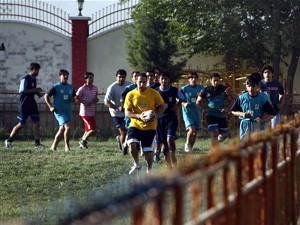Afghan players dream of rugby glory

Hopeful Afghan rugby players practice in a field hockey venue, alongside Kabul's Olympic Stadium, the same arena the Taliban used to cut off the hands of thieves and hold executions during their five-year rule in Kabul, Afghanistan (AP Photo).
KABUL, Afghanistan — On a dusty field, as military helicopters buzz overhead, a group of Afghans are tackling a new challenge.
Divided into two lines, the hopeful rugby players race toward each other, one line of men trying to wrap their arms around the legs of players on the other line to stop them. Only a few carry the hulking frame typical of rugby players, the rest almost impossibly skinny and light on their feet. One runs barefoot.
This is the start of Afghan rugby, a sport still in its infancy in a war-ravaged nation where training can be canceled by Taliban attacks and players are routinely frisked for suicide bomb vests.
Organizers and athletes dream of one day being recognized internationally and playing against famous teams like the New Zealand All Blacks and South Africa’s Springboks, though they have many pitches to travel before that day.
Despite once being occupied by the British, rugby never took hold in Afghanistan, though the nation remains a place where contact sports have a history, and spectators aren’t squeamish.
Cockfights and dogfights regularly take place in the early morning, and horse-riding buzkashi players still pull around headless goat carcasses in the Afghan version of polo.
Afghan children play football and a rough-and-tumble game that bears similarities to rugby, and decades of war have also influenced generations of young men willing throw themselves at an opponent.
“They’re not afraid of the physical contact of the game,” said Steve Brooking, a British expatriate who has worked for embassy and non-profit organizations here, and is now helping organize the team.
But the war does make things difficult for the young squad.
While about 60 men have come out to practice between Afghanistan’s capital of Kabul and the eastern city of Jalalabad, attacks in Herat led to organizers canceling a planned training clinic there.
Finding a place to practice also remains a problem in Kabul, as players found themselves spraining their wrists in falls on the largely grassless field of a Kabul park. Now the squad trains in a field hockey venue alongside Kabul’s Olympic stadium, the same arena the Taliban used to cut off the hands of thieves and hold executions during their five-year rule.
“Rugby is a new game for Afghanistan, but the young Afghan generation, … they can play this game,” said Mohammed Shur, a 29-year-old gemstone seller who helps coach the players.
Since the fall of the Taliban in 2001, once-banned sports have returned to Afghanistan. The grunt of martial arts training can be heard echoing through the country’s Olympic stadium.
None have taken off as much as cricket, a once-uncommon sport in this country but not in the region, with Pakistan and India being world powers in the sport.
Afghanistan has developed a reputation across the cricket world after winning the World Cricket League Division 3 tournament in 2009, qualifying for the Twenty20 World Cup, and beating the U.S. team last year.
Now players hope the same for rugby, which has seen a recent surge of interest from the Middle East and the Islamic world. Dubai has built a specialized academy for rugby players and now hosts tournaments, while unions have been set up in the United Arab Emirates, Lebanon and Qatar.
Neighbor Pakistan long has had a rugby team, while Iran became an associate member of the International Rugby Board last year.
“These are exciting times for rugby in west Asia, and working in collaboration with the Asian Rugby Football Union we are currently investing over $3 million annually in development, high performance and tournament programs across Asia to ensure that there are opportunities for all to engage with the sport,” IRB Chairman Bernard Lapasset said.
India now has over 17,000 registered players throughout all of its states and territories, along with over 50 senior men’s clubs and school teams.
Nations like Japan and South Korea are regular participants in the Rugby World Cup, with Japan set to become the first Asian host when it stages the 2019 edition.
Afghanistan will take one step at a time, first seeking membership to the ARFU, which could lead later to membership of the IRB. The move also comes as the 2016 Olympics will include the shortened seven-a-side rugby, after more than 80 years away from the games.
“It is exciting to see Afghanistan embracing rugby,” said IRB spokesman Dominic Rumbles.
For now though, the rugby hopefuls of Afghanistan concentrate on the basics. Practice remains focused on tackle after tackle, pass after pass.
“You’ve got to be behind him!” Brooking shouts during one practice, the Afghans stopping play to listen as another translates to Dari. “You’ve got to be behind him to get the ball!”
Despite the steep learning curve, practice matches draw the curious along the waist-high, tattered fence lining the field as the men shout for passes and race for tries.
“Now the cricket (team) is international, maybe, by the grace of god, the rugby will be,” said player Mohammed Edris, a 24-year-old dentist.














